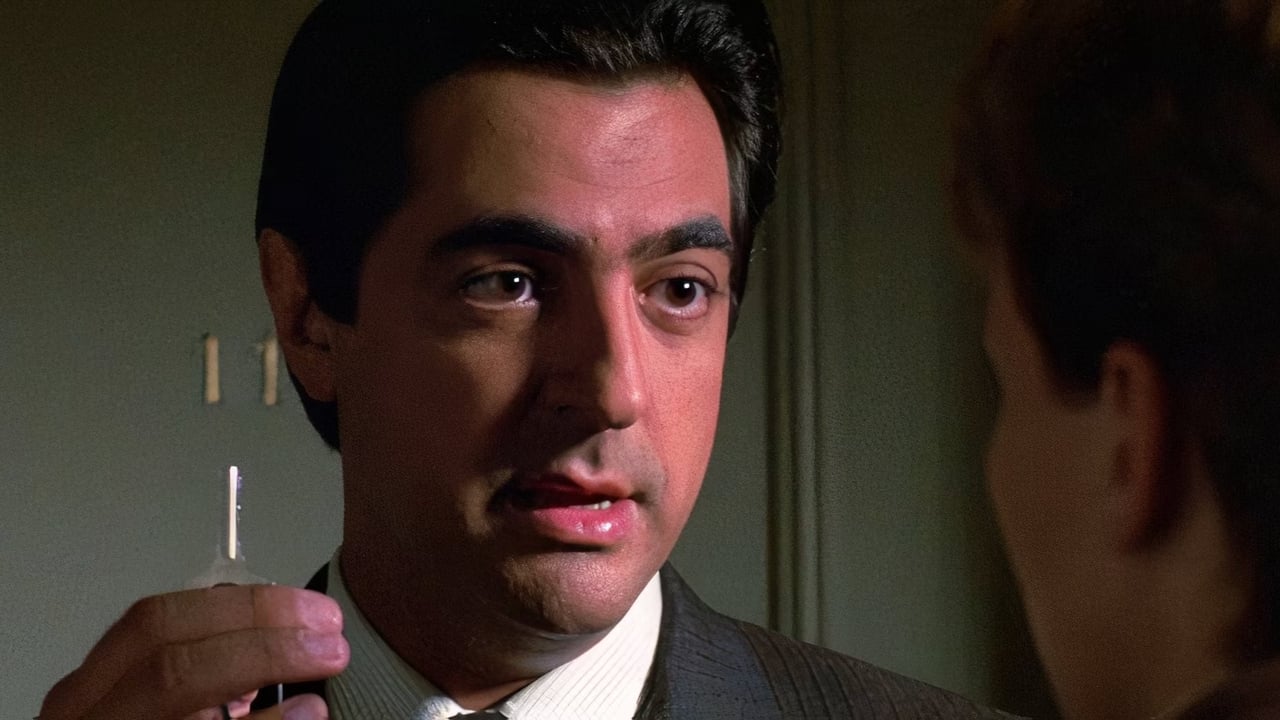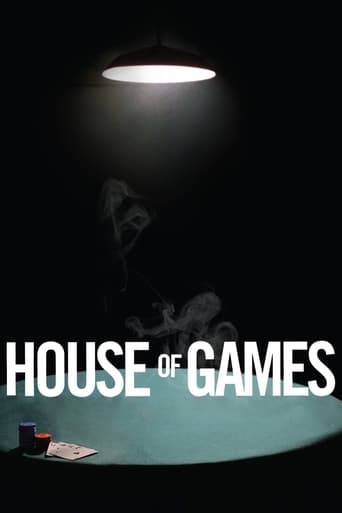

Good concept, poorly executed.
... View MoreExcellent, smart action film.
... View MoreInstead, you get a movie that's enjoyable enough, but leaves you feeling like it could have been much, much more.
... View MoreThere are moments that feel comical, some horrific, and some downright inspiring but the tonal shifts hardly matter as the end results come to a film that's perfect for this time.
... View MoreMamet should be relieved that his directorial debut in House of Games was way back in 87, because it would probably get eaten alive today. When the film-maker/screenwriter in his case waves the hand over the audience and reveals the big con, the reaction is almost always surprise, because usually the narrative has been constructed competently and subtly enough that it is not entirely predictable. But there is a secondary effect, where the plot details that have culminated into this big reveal are rendered hazy or allowed to become somewhat illogical because well, it was all a ruse. HoG doesn't fall entirely into this trap like say, The Usual Suspects, but remains uninspiring.Margaret Ford is a successful and best-selling psychiatrist, and seems to truly care about her patients despite the spotlight. In the opening, a stranger recognises her face beneath her sunglasses, a little clue that suggests that she is not nearly as covert as she thinks she is. When she confronts a loan-shark in a shady bar, there is nothing but good intentions, and she reads him from the start. The trouble is, he reads her better. Mike (Joe Mantegna) is best performer of the film in a literal sense; he is smooth talking, but could appear so even without explaining the gears and cogs of the con world. They face each other only after a few glances, and he so overpoweringly seduces her into his world. Later, as he demonstrates a con but cannot scam a genuine well-meaning man, the illusion is complete - and we too, believe this. Mamet's story would completely fall apart if it weren't for these initial deduction from Margaret as she spot the water gun scam - the audience needs to believe that she is a good judge of character, and also that they themselves trust Margaret's judgement. The closeup and reaction shots of the ring and the fake gun seem objective in their deceit and in unveiling her keen eye. In the hotel room, as she glances over at Mike, he replies back with the confidence and control that has been instilled into her, and we are so assured. Later, we are placed in her unknowing shoes, full of fear and paranoia, and the lighting characterises this, plunging her figure in complete darkness as she overhears snippets of a police sting. There is a jump scare, which is the only one and carefully placed, which signals her growing anxiety, which is brilliantly combined with a harmless point of the finger and the ever ringing school bell. It is unfortunate that Crouse cannot match a plot and supporting actor of such promising calibre. Her performance is stilted, and cannot produce the necessary subtext, so we are treated to mounds of exposition from the elderly companion who acts as some sort of psychiatrist for Margaret herself. Her delivery is mostly mechanical, only seldom smiles or laughs or shows any signs of affection as she is seduced, and in the climax, she cannot conjure enough rage although she has been clearly wronged. Maybe Mamet, her at the time husband, might have found Crouse attractive and hypnotic and appropriate to step into the femme fatale role, but there is barely a hint of this person in the film. And so his dialogue, which is sometimes twice as long as necessary as per theatre, which is brash and direct, seems to often bounce off a mannequin that is halfway glance at the script instructions (in parentheses such as these - prompting her to deliver her dialogue with resignation, with wonder, with irritation) but cannot fulfill them anyway. At times Mamet shows his lack of directing experience and signals that he originates from the stage; characters will stand up or aside to have a whispered private conversation, yet the other parties are conspicuous and clearly in the frame. Such a thing would flow with ease in a play, but here it becomes stilted, and the atmosphere and tension that Mamet has no doubt thought of while writing the script evaporates.
... View MoreThis has to be one of the most underrated movies in the history of cinema . I don't always agree with Roger Ebert (RIP) , but I'm 100% with him when it comes to this movie. This is a brilliant movie that yet needs to be discovered by the world , despite it's not completely anonymous to mainstream audience. Most of the complains that some reviewers had with this movie I find to be completely unintelligible . Lack of stars ? That's a big plus for the movie . Mamet didn't want stars in his movie ( he could afford them after the success of Brian de Palma's "The Untouchables" – he was the writer of that movie) for similar reason that Kubrick didn't wanted to cast them in "2001 : Space odyssey" – he was afraid they would distract the viewer from the story itself. It's easier to believe in what is happening on the screen , if you aren't watching a famous movie star . Predictability ? There's hardly any in here and show me a thriller that isn't one bit predictable. Theatricality ? Many great movies are theatrical – "Twelve angry men" , "Dial M for murder" , "The Hill" , "Sleuth" "House of games" isn't really about fun. It isn't about who is gonna trick who and how. Mamet doesn't stop when the con is over , but goes one step more – he asks how the con changes you. Or maybe it didn't really changed you and only allowed to see truth about yourself ? "House of games" is much more deeper and darker than typical lighthearted fun movie about con artists . The famous "The Sting" looks shallow by the comparison (more entertaining ? Definitely , but still rather shallow).This is a debut for Mamet as a director . "House of games" is pretty much directed as a stage play . Mamet's directing style is intentionally flat and cold . There is a hypnotic quality in it. Mamet drags you into world where any kind of human emotion is barely seen. The dialogue here is stilted – a sign of modern theatre. It also gives the movie an surreal feel.The screenplay is brilliant. It's all based on psychology. A subtle gesture or choice of words is incredibly important. Not the twists are important , but the characters. The player and the mark. It's a character driven story. Watch out for small signs like clothes , because they will tell you what is going on inside somebody's head. David Mamet really seems to know human nature. This movie made me realize just how much similar movie maker is to a con artist and especially how in our everyday life were playing games with each other and even with ourselves.Lindsay Crouse doesn't help the movie with her dour performance , but I can't say she destroys it either. She isn't exactly a bad actress . Crouse gave a good performance in "Places in heart" (for which she was nominated for Oscar). Maybe she was misguided by Mamet (her husband at that time) who told her to don't show too many emotions. Anyway her deadpan emotions for most of the time fits the movie and I could name few actresses who would be even worse than Crouse in this particular role (Jennifer Aniston for example).On other hand Joe Mantegna (mostly known for "Godfather 3") not quite steals the show , but definitely shines every time he's on the screen . He's confident , manly , dominating and has an aura of mystery around him. Along with "Homicide" (another Mamet movie) this is his best performance . The other actors and actresses don't really have much to play , but they fit their characters and are OK.The ending is disturbing and thought provoking . It will make you ask questions about good and evil , human nature and psychology . You will find something new with another re-watch of the movie. I give it 9/10.
... View MoreMargaret Ford (Lindsay Crouse) is a psychiatrist and a best selling writer. Her patient Billy Hahn is suicidal from his $25k gambling debts. She decides to help him by confronting his bookie Mike (Joe Mantegna). It turns out Billy only owes $800 and Mike is willing to forgive it if she does him a favor.Director David Mamet has written a tight tensed thriller about cons and con-men. I have to admit that it was eye opening with the various cons when I first saw this. It's aged a little since then or maybe I've aged. The cons are no longer eye opening, but you can see them coming a mile away. Although, they're like old friends that you want to visit once in awhile.The writing is still tightly wound. Lindsay Crouse has that cool demeanor. Sometimes still waters run deep, and her character has a dark side. Joe Mantegna has that dark scheming character down. For a first time directing effort, this was quite spectacular. His simplistic vision allows the actors to fill the screen. Luckily he had some great ones working here.
... View MoreI first experimented David Mamet with The Spanish Prisoner, and I found it unimpressive. The Mamet pattern is pretty simple and is explained extensively in The House of Games: set up a story in some edgy setting and then build up the audience trust in the proceedings, only to add a manipulative twisty ending.There is one big flaw with that kind of 'ain't I clever' artsy flicks, and it is exactly the same as with whodunits. Either the twist is too abrupt and it really feels like an 'in your face' conclusion, or it is too soft and you are bored because you saw it coming. Either way it's a loser. I reckon some like deceptive story lines, and yes it works once in a while: The Usual Suspects worked... on first viewing, but there is no way to enjoy it again afterwards.What I liked in The House of Games is the soft directing style, it's a bit too much on the artsy stagey side but it is really enjoyable to have a director know how to set up an atmosphere. Then I think most of the movie exists thanks to Joe Mantegna. He is very good and it helps because the lead is a pretty lousy character. And the actress is totally unimpressive: there is expressing a lot with little, and there is little little.I guess the bland introverted hero is a way to summon cheap mystery, but it is not really a way to captivate one's audience. With such a low level of involvement, no wonder you see the twist coming and then you just don't care any more about the main character, then the ending simply doesn't matter.
... View More